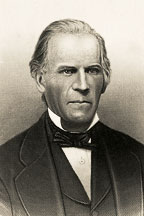William Kennon
William Kennon (born May 14, 1793 in Uniontown , Fayette County , Pennsylvania , † November 2, 1881 in St. Clairsville , Ohio ) was an American lawyer and politician . Between 1829 and 1833 and again from 1835 to 1837 he represented the state of Ohio in the US House of Representatives .
Career
In 1804, William Kennon moved with his parents to Belmont County , Ohio. He attended public schools in his respective homeland and Franklin College in New Athens . After a subsequent law degree and his admission as a lawyer in 1824, he began to work in St. Clairsville in this profession. In the 1820s he joined the movement around the future President Andrew Jackson and became a member of the Democratic Party founded by this in 1828 .
In the congressional elections of 1828 , Kennon was elected to the US House of Representatives in Washington, DC in the tenth constituency of Ohio , where he succeeded John Davenport on March 4, 1829 . After re-election, he was able to complete two legislative terms in Congress until March 3, 1833 . Since President Jackson took office in 1829, there has been heated debate inside and outside of Congress about its policies. It was about the controversial enforcement of the Indian Removal Act , the conflict with the state of South Carolina , which culminated in the nullification crisis , and the banking policy of the president. In 1832, William Kennon was not re-elected. In the elections of 1834 he was re-elected to Congress in the eleventh district of his state as the successor to James Martin Bell , where he could complete another term between March 4, 1835 and March 3, 1837. In 1836 he was not confirmed in this mandate.
Between 1840 and 1847, William Kennon was a presiding judge on the Court of Appeal. In 1850 he participated as a delegate to a constitutional convention for Ohio. From 1854 to 1856 he was a judge on the Supreme Court of Ohio . After that he practiced as a lawyer again. When the civil war broke out , he switched to the Republican Party . He died on November 2, 1881 in St. Clairsville, where he was also buried. His eponymous cousin William Kennon Jr. (1802-1867) was also a member of Congress.
Web links
- William Kennon in the Biographical Directory of the United States Congress (English)
- William Kennon in the database of Find a Grave (English)
| personal data | |
|---|---|
| SURNAME | Kennon, William |
| BRIEF DESCRIPTION | American lawyer and politician |
| DATE OF BIRTH | May 14, 1793 |
| PLACE OF BIRTH | Uniontown , Fayette County , Pennsylvania |
| DATE OF DEATH | November 2, 1881 |
| Place of death | St. Clairsville , Ohio |

